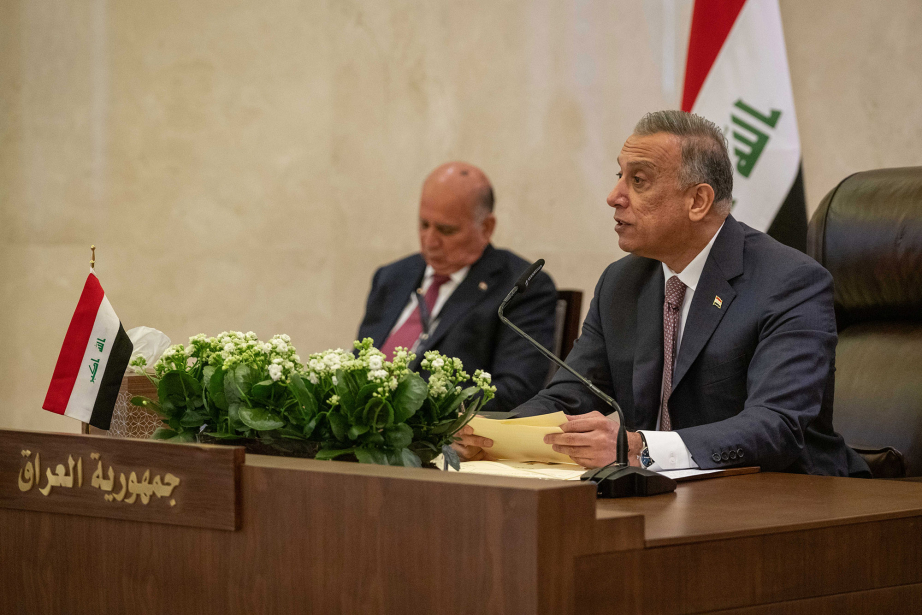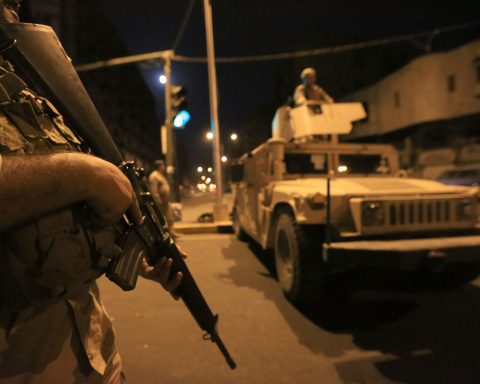Baghdad will host a regional conference revolving around regional security and stability on August 28. The Iraqi government hopes that the conference will also spur economic partnership and integration among regional actors.
Numerous governments in the region are invited to participate in the conference, officially titled “Baghdad Conference for Cooperation and Partnership”, in an effort to foster regional dialogue and reduce tensions. The name highlights the extending scope of the conference as it was primarily focused on Iraq’s relationship with its neighbors, yet it evolved into a regional conference.
“Baghdad will host a conference entitled Cooperation and Partnership, in an initiative led by Iraqi Prime Minister Mustafa Al-Kadhimi, based on a conviction that the stability of the region has positive repercussions on the Iraqi scene,” a tweet from the official Twitter account of the conference read.
An Iraqi source said that the conference also aims to convey a message of stability and peace in the region.
PM al-Kadhimi authorized several of his cabinet members earlier this month in extending invites for heads of state. Invitees include Turkish President Recep Tayyip Erdoğan, Iranian President Ebrahim Raisi, and Egyptian President Abdel Fattah el-Sisi.
According to an Iraqi official, an undisclosed number of European countries and the United States were also invited.
France is reportedly a co-organizer of the conference which would explain President Macron’s repeated appraisals of the regional initiative. He also confirmed his attendance in a phone call with PM al-Kadhimi in mid-August.
While Turkish President Erdoğan announced that he will not be present in Baghdad for the meeting, either Foreign Minister Mevlüt Çavuşoğlu or Vice President Fuat Oktay is expected to attend.
An Iranian delegation headed by the newly-appointed FM Hossein Amir-Abdollahian will represent Iran at the conference. Iraq will be Amir-Abdollahian’s first visit as foreign minister, after he was approved by the Iranian parliament earlier this week.
Among the Gulf states, Kuwaiti Emir Sheikh Nawaf al-Ahmad al-Sabah, Jordanian King Abdullah II, Saudi King Salman bin Abdulaziz, Qatari Emir Sheikh Tamim bin Hamad al-Thani, Emirati Crown Prince Sheikh Mohammed bin Zayed al-Nahyan were reportedly invited. “Saudi and Emirati diplomatic representation will be high” Amwaj Media reported.
The Iraqi Minister of Planning, Minister of Finance, and Minister of Foreign Affairs were among those tasked with presenting official invitation letters to regional leaders.
Iraqi officials made clear that Bashar al-Assad did not receive an invitation. However, the leader of the Popular Mobilization Forces (PMF) personally visited al-Assad in Damascus to extend him an invite to join the conference. Following the said meeting, the Iraqi government publicly announced that al-Assad was not invited.
The PMF was formed after Ayatollah Ali al-Sistani, the spiritual leader of Iraq’s Shia Muslims, issued a fatwa and called for the nation to take up arms against ISIS’ onslaught in 2014. The Iraqi Parliament formally recognized the PMF in 2016 as part of the Iraqi Security Forces (ISF). The PMF serves as a state-sanctioned umbrella organization involving a number of Iran-backed Shia militias as well as formal Iraqi security personnel.
The move to extend an invitation to the Assad regime by the PMF could be seen as an attempt by the Iranian leadership to undercut PM al-Kadhimi’s efforts to establish a joint dialogue, because some participants, including France, do not recognize the Assad regime as legitimate. The PMF reportedly “came against” the summit arguing that it will harbour “enemies of Iraq.”
Analysts consider some elements of the PMF such as Kata’ib Hezbollah or Asa’ib Ahl’il Haq as extensions of the Iranian Revolutionary Guard Corps’ transnational militia network.
There is increased diplomatic traffic ahead of the conference as the UAE’s National Security Advisor Sheikh Tahnoun Bin Zayed al-Nahyan visited Ankara to meet Turkish President Erdoğan last week.
Sheikh Tahnoun also met with Qatar’s Emir Sheikh Tamim to discuss bilateral relations between the two countries earlier on 26 August. Sheikh Tahnoun’s latest visit comes after he met with Egyptian President el-Sisi and Jordanian King Abdullah II last week.
The Iraqi leadership set itself up for ambitious goals as contentious issues such as the war in Yemen, regional water disputes, and tensions between Saudi Arabia and Iran will be on the table.
Unnamed Iraqi sources remain reticent about possible outcomes as the topics of discussion at the summit are too complex to expect substantial progress.
Indeed, Amwaj Media reported that even PM al-Kadhimi’s expectations “were tempered” regarding the conference. Yet, the Baghdad Conference could establish a foundation, or provide a platform, for future regional dialogues. A French source echoed this sentiment by saying that “the aim is to initiate something here and continue after this conference.”













